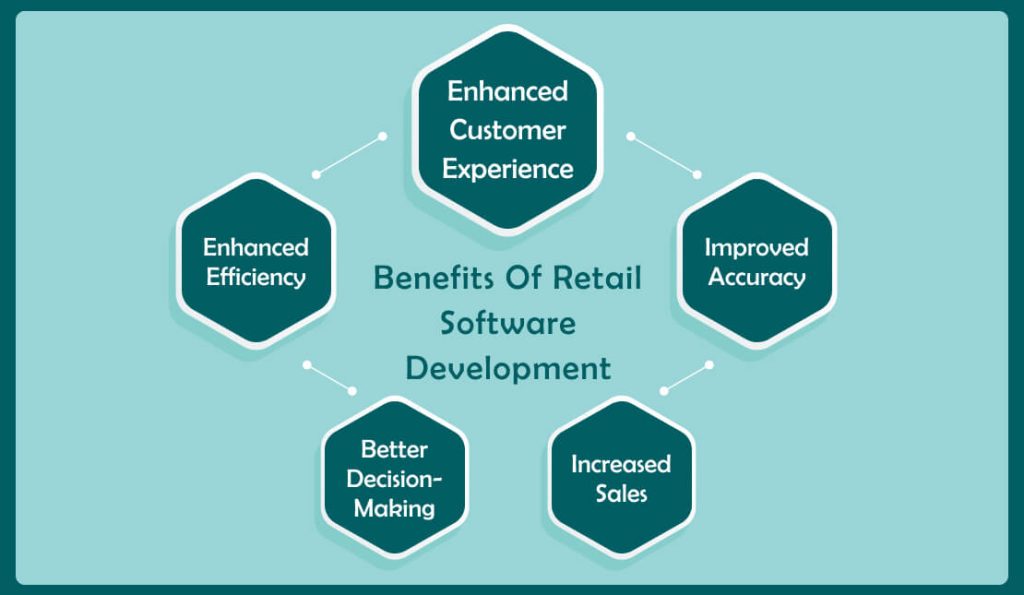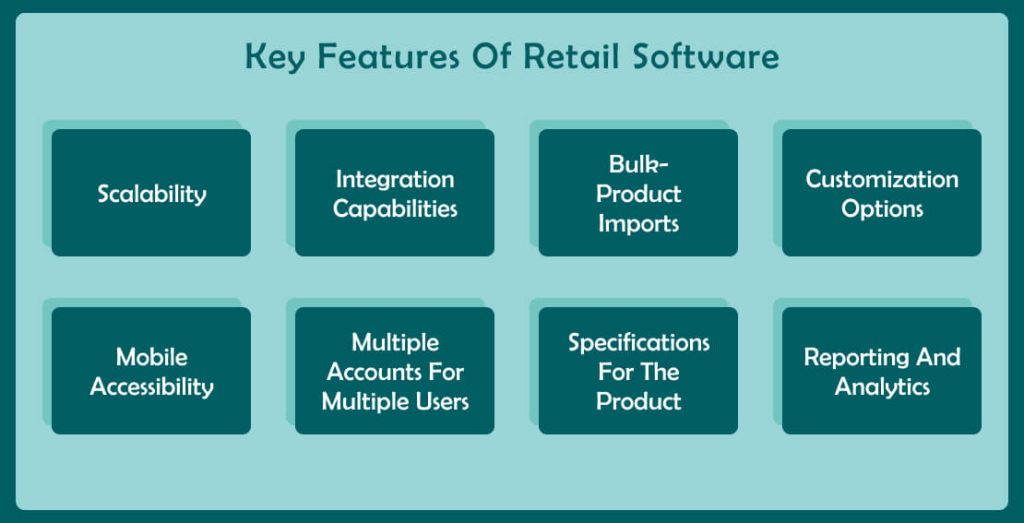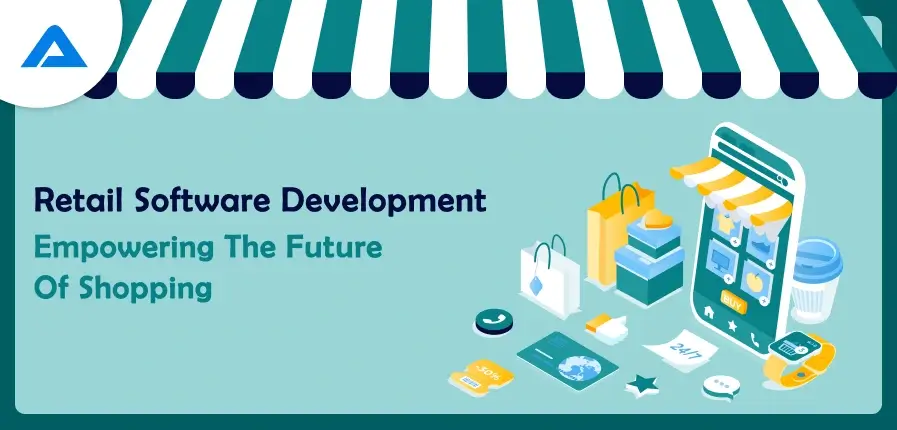Retailers face ever-changing challenges in the fast-paced business environment to keep up with the competition. Customers’ expectations from businesses are increasing, requiring innovative and efficient solutions that meet those standards. The shopping experience at the retail store is experiencing a significant shift. Today’s customers expect quick and straightforward demonstrations, no matter whether they’re physically or online.
Retail software development has been recognized as an essential advantage in today’s market. The solutions provide a wide variety of benefits that can enable retailers to prosper. Retailers are adopting technological solutions to remain competitive, enhance the customer experience, and streamline processes as consumers shift to online platforms. Retail software development has evolved into an integral force that allows companies to change and thrive within this ever-changing environment.
In this post, we explore the value of retail software solutions for retailers. We will explore how these software are changing the future of shopping.
Understanding Retail Software
Retail software is a collection of digital tools designed to simplify and improve the various elements of retail operations. From inventory management to point-of-sale (POS) systems to Customer relationship management (CRM) and online shopping platforms, retail software covers many options designed to meet the diverse needs of retailers. Businesses use software to manage their retail business and oversee various aspects of their retail supply chain. Retail software is commonly employed to increase accounting efficiency and inventory precision, monitor the performance of companies, and monitor critical data about the customer.
Retail software automates and streamlines key retail management processes to improve operations, boost efficiency throughout the company, and reduce costs. It integrates sales processing with functions like inventory management, vendor management and sales, customer service marketing, accounting, and customer service. Based on the company’s needs and requirements, the software can be set up on site or accessible via cloud-based subscriptions.
Benefits Of Retail Software Development

Retail software provides a wealth of advantages that significantly improve the profitability and efficiency of retail business operations. We’ll explore the ways these benefits translate into real business results:
Enhanced Efficiency
In today’s competitive retail world, time is a key factor. Software for retail acts as a powerful force multiplier, making simple tasks more straightforward to handle, such as the management of inventory, order processing, and tracking.
To eliminate manual intervention and streamline workflows, the retail software can free up time and energy, which allows employees to concentrate on higher-value processes like customer support and strategic plans. This increased efficiency not only improves the efficiency of operational processes. Still, it also increases overall efficiency and flexibility.
Enhanced Customer Experience
In today’s world of interactive retail, customer satisfaction is the top priority. Software used in retail plays a crucial function in creating smooth and customized shopping experiences that appeal to today’s sophisticated shoppers. With the help of data analytics retailers can anticipate customers’ preferences, create personalized product recommendations, and provide targeted promotional offers that build deeper relationships and loyalty.
Retail software also facilitates seamless integration across channels, allowing customers to connect with brands through various channels, including at a store, online, and through mobile devices. This omnichannel approach not only increases convenience and accessibility but also builds lasting relationships that go beyond the realm of transactions.
Improved Accuracy
It is crucial to be precise in retail, where minor errors can result in devastating consequences. Retail software is a solid shield against error and inconsistencies by automatizing critical procedures and applying standard processes.
It doesn’t matter if it’s tracking inventory price calculations, inventory tracking, or financial reports; the retail software can guarantee pinpoint accuracy and integrity of data, thus reducing the possibility of costly errors and regulatory compliance concerns. More accuracy means greater credibility, allowing retailers to build confidence among their customers and maintain their credibility for trust and professionalism.
Better Decision-Making
In the ever-changing world of retail, making informed choices could be the deciding factor between stagnation and success. Custom retail software acts as a compass to the future. It provides retail stores with in-depth insights and immediate analytics to help them make better decisions. Retail software uncovers hidden patterns in aggregating and analyzing massive amounts of data covering customer behaviour, sales trends, and market dynamics.
It identifies emerging opportunities and reduces the risk of potential dangers. With this vital information, retail stores can make decisions on data that improve their allocation of resources, develop marketing strategies, and capitalize on the latest market trends, giving them more competitive and competitive advantages in a constantly changing market.

Boost the Efficiency of Your Retail Operations Today!

Pooja Upadhyay
Director Of People Operations & Client Relations
Increased Sales
An attractive e-commerce site can increase the number of customers you can reach, thus increasing your profits. The reason is that those shopping online are usually more likely to become repeat purchasers than customers who buy in brick-and-mortar shops. Numerous retailers are making use of an e-commerce program to improve sales. When they’ve invested in the creation of their online shop, they will see results within a short time.
Retail software development is tailored to fit the requirements of every retailer. This ensures that every company has a distinct customer experience while buying online. Once this program is implemented, it’s more efficient for businesses to monitor consumer behaviour. It discovers ways to improve their methods or develop fresh ones based on consumers’ preferences for particular products or services provided by companies in their sector.
Improved Brand Image And Reputation
A well-designed e-commerce solution helps you improve your visibility to potential customers. E-commerce-based retailers can enhance the image of their brands with more conversion rates, quicker checkout times, and more targeted marketing, among others. The result is increased sales because customers become acquainted with stores that provide the services.
Key Features Of Retail Software

Suppose you are looking at retail software to run your business. In that case, thinking about the most essential features that could make a massive difference to your operation is crucial. Below are some of the most essential features that you must look for.
Scalability
The retail software you use must be able to expand and change with the business. Choose a solution with scaling capabilities that allow you to effortlessly grow your business, increase the number of users, and incorporate new features when your company expands.
Scalability will ensure that the investment in software stays relevant and productive in the long term. It ensures that you are ready to meet the growing demand and increasing complexity without disrupting your business.
Integration Capabilities
Retail operations’ efficiency depends on the smooth transfer of information between various platforms and systems. If you choose custom retail software development, look for solutions with solid integration features. Find software that will effortlessly integrate with your organization’s other equipment and systems, including E-commerce platforms, accounting software, and Customer relation management (CRM) solutions. Integration will ensure seamless and consistent processes, removing information silos and also reducing the need for manual entry of data, eventually increasing efficiency and productivity.
Bulk-Product Imports
Inputting product details is one of the longest-running aspects of setting up the POS system. Specific POS software allows the import of all data about the product in one go, creating a procedure called bulk product imports.
Imports of bulk-produced products are crucial if you offer a variety of items or your products are constantly changing. So, you don’t need to manually upload your products, which makes importing products unproductive when selling many items.
Customization Options
Each retail company is different, with its unique set of demands, workflows, and individual preferences. Look for solutions that provide numerous customization possibilities for the best value from your investment in retail software.
Choose software that allows the user to modify the features, workflows, and user interfaces specific to you and your workflows in line with your needs. The ability to customize will enable you to set up the program to meet your business’s requirements and provide an individualized solution that best assists your business processes and workflows.
Mobile Accessibility
Mobile devices are essential for productivity and connection in today’s fast-paced retail environment. Select a retail mobile application development with the most robust mobile access features that allow you to access crucial business information and carry out important tasks at any time, from anywhere.
Choose a solution offering user-friendly mobile interfaces and applications optimized for various operating platforms. Mobile access allows you and your staff to work efficiently when you’re at the front of sales, attending trade shows, or just meeting with customers. Using mobile-friendly software that keeps you informed, responsive, and flexible improves your effectiveness and competitiveness in the marketplace.
Multiple Accounts For Multiple Users
A lot of POS platforms support several user accounts. If you’re a sole proprietor, choose the POS that supports this. Certain POS companies provide unlimited accounts to customers who are on higher services.
Suppose each person who calls to make sales has a distinct login. In that case, you can track each employee’s efficiency, identify issues, and award top employees. The feature lets you monitor sales about commissions and bonus payments to employees. These are both useful when your business offers such compensation forms. A further benefit of this multi-login system is recognizing mistakes and theft.
Specifications For The Product
Suppose you’re offering multiple product variants, for example, various colours, choices, or sizes. In that case, your POS software should be able to distinguish these. So, you’ll be able to get better information for making a reorder because you’re aware of what’s being sold on a micro degree. Bundling goods commonly ordered together accelerate checkout, increasing sales and giving discount coupons to customers for bulk purchases.
Reporting And Analytics
Analytics based on data is crucial for making educated decisions and enabling strategic growth in retail. If you are looking at shopping software for retail, focus on solutions that provide powerful analytics and reporting capabilities. Find software with extensive dashboards, custom reports, and advanced analytical tools for gaining comprehensive insights into your business’s performance, customer behaviour, and trends in the market.
Analytics and reporting help you discover opportunities, improve processes, and minimize risks, improving your profitability and competitiveness within the competitive retail market. Through access to relevant data, you can make informed decisions that push your business forward and help drive steady expansion.

How Retail Software Is Empowering The Future Of Shopping?
Software solutions for retail include many software and hardware specifically developed for the sector. These flexible tools enhance various aspects of running a business in the retail sector, including managing inventory, point of sale (POS) systems, CRM software development, and online shopping platforms.
Being a retail store that can provide an efficient and easy shopping experience they want is crucial to establishing an enduring customer. There’s a chance you don’t have access to your information, making it nearly impossible to keep pace with customer needs and ensure a high standard of service. Many businesses have decided to move to a single, powerful retail management solution developed by a custom software development services company, which lets them unify their operations on one system.
Retail’s Changing Face
Retail has become an increasingly important factor in customers’ purchasing behaviour. Online shopping convenience has recently caused a massive change within the industry. The growth of online shopping has been remarkable, and the impact of a global pandemic has increased retailers’ use of digital platforms.
As the landscape changes, traditional brick-and-mortar stores have to redesign themselves to stay relevant and competitive. Software development for retail evolves as an answer to strategic challenges and the creation of new possibilities.
Point-Of-Sale (POS) And Payment Systems
A streamlined point-of-sale system is essential for both online and physical retail stores. The most modern POS software is integrated with accounting, inventory management, and customer information, making the checkout process simpler and decreasing manual errors.
Additionally, retail software ensures safe and secure payment options for clients. From mobile payment to digital wallets, retail stores can provide various payment options that cater to multiple preferences and populations.
Data Analytics And Business Intelligence
Decision-making based on data is a practical advantage for retailers. Software development for retail integrates the use of data analytics as well as business intelligence instruments to give valuable insight into customer behaviours, sales patterns, and general efficiency. Retailers can use these insights to make better choices, improve pricing strategies, develop specific marketing campaigns, and recognize emerging market trends.
Offer Diverse Services
Retailers have shifted from the traditional sales model to distinguish themselves from their competitors. Companies offer fitting sessions to assist customers in finding the best golf clubs and repair and maintenance services for those requiring repairs to their equipment and other offerings. However, managing various services requires a sophisticated software system to help keep appointments in order and provide top-quality customer service.
Suppose you are using a single retail management software instead of many. In that case, you can organize all the value-added services within the software you utilize for regular retail business – classes, workshops, consultation pop-ups, public events, etc.
Enhanced Security And Compliance
Compliance and data security are other important aspects to consider when developing retail software. Retail software has robust security safeguards, encryption techniques, and authentication systems to secure sensitive information. Additionally, the software allows conformity with data protection law and industry standards, increasing customers’ trust while minimizing possible legal risks.
Inventory And Supply Chain Management
Inventory management is essential for retail’s success. Supply Chain Management Software for retail development offers high-end inventory management systems that provide live monitoring of stock levels and sales trends. Retail software also helps optimize supply chains by allowing for better collaboration between distributors, suppliers, and fulfilment centers. Data-driven and automated insights reduce operating costs and increase effectiveness, ensuring that products are delivered to customers on time.
Customer Engagement And Personalization
Personalization of shopping has been a significant aspect for businesses in this digital age. Retail software can use analytics and customer data to create a personalized retailing experience. Retailers can provide personalized recommendations and offers by analyzing preferences, purchasing data, and browsing patterns.
Customer engagement does not have to be restricted to shopping alone. Retail software development also incorporates customer relationship management (CRM) software that allows retailers to maintain relationships after the purchase point. The effectiveness of communication via personalized emails, loyalty programs, and feedback systems boosts customer loyalty and brand recognition.
Conclusion
In the end, Retail Software Development services are changing the retail industry. Retail software allows businesses to adapt to the retailer-changing landscape and remain relevant in a digitally driven future. This includes creating multi-channel experiences, optimizing inventory management, and enabling customization by leveraging data analytics.Retail software solutions can help retailers boost customers’ loyalty, improve their operations, and position themselves as leaders in the new retail revolution. As the retail industry grows, adopting the latest technologies driven solutions will be beneficial to achieving expansion and success in shopping.

Revolutionize your retail operations with our comprehensive software development expertise!

Pooja Upadhyay
Director Of People Operations & Client Relations


